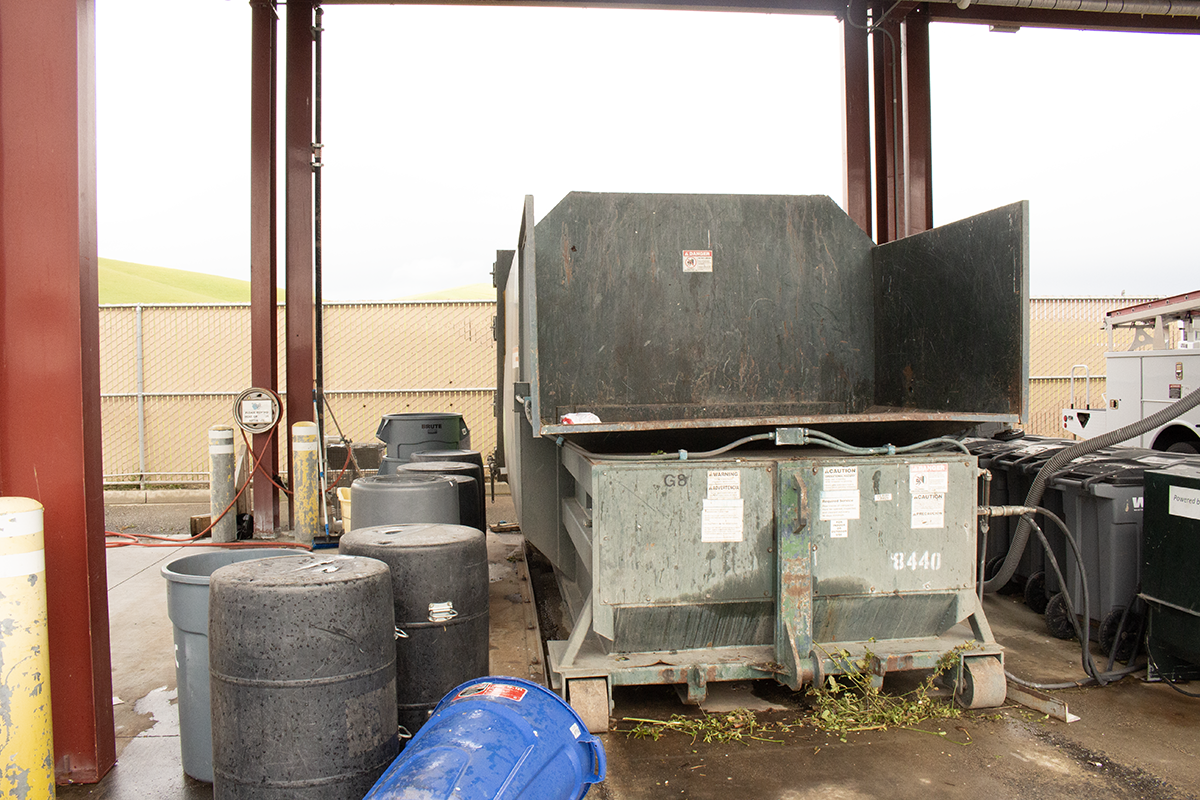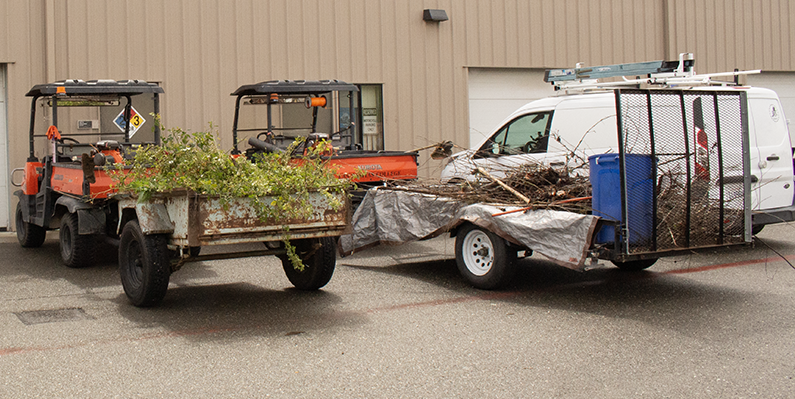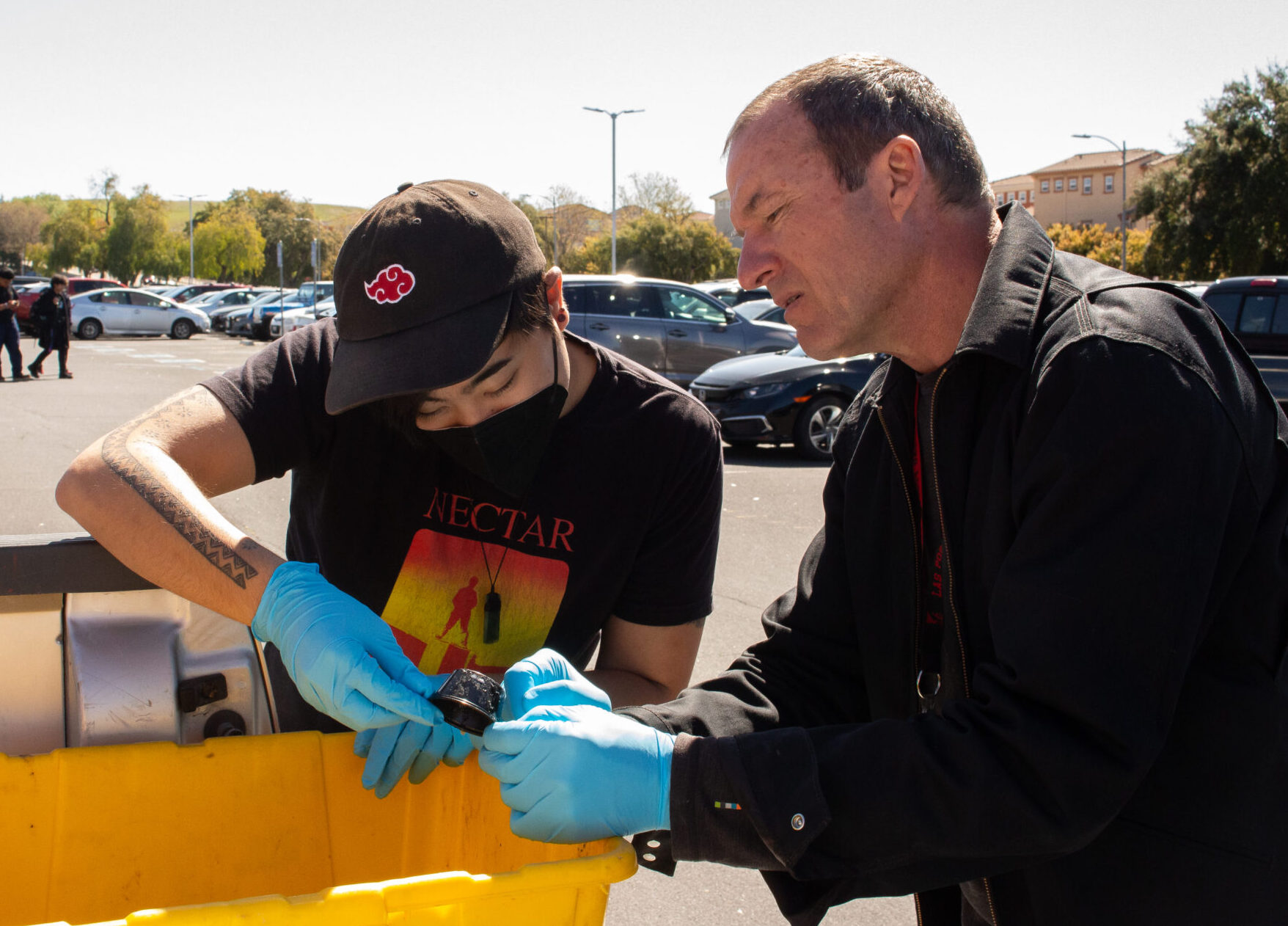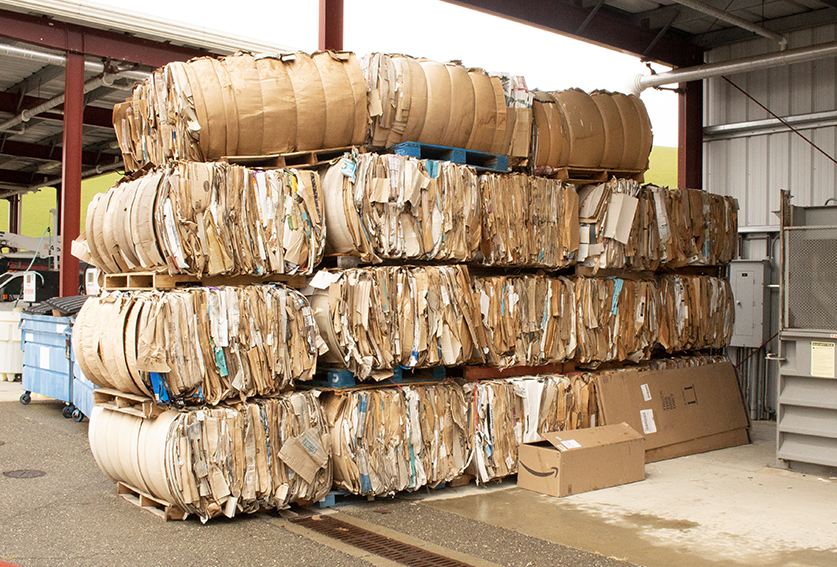Campus leaders are proposing sustainable solutions with help of non-profit group
Las Positas College recycles and composts. But it’s not perfect.
The college’s trash hauler is Texas-based Waste Management, the leading waste company in America. Like most vendors, it doesn’t sort the recycling and trash. It delivers LPC’s waste to Republic Services, a landfill in Livermore. Republic Services, the second-largest waste company in the nation, does not have a trash sorter at its Vasco Road location, either.

Livermore Sanitation picks up recycling collected from designated recycling bins around campus. The sorting is up to whomever initially throws away their trash.
The school’s custodial staff doesn’t sort the recycling, due to bandwidth issues. So the school’s recyclable products in trash are never recycled. In addition, LPC does not provide compost bins across campus or compost kitchen waste.
There are legal implications for not having recycling or composting programs at an institution like Las Positas, but enforcement of these laws is up to the corresponding jurisdictions. According to Assembly Bill 341, passed in 2012, commercial businesses and public entities producing four yards of solid waste or more per week must arrange recycling services. The intention of this bill was to reduce the amount of garbage sent to landfills and greenhouse gas emissions.
Senate Bill 1383, passed in 2022, requires educational institutes to recycle organic materials. The 3300 building composts green waste, according to horticulture professor Thomas Fuller. Green waste is any organic waste that can be recycled like grass clippings, leaves or kitchen waste. Walter Blevins, the director of maintenance and operations (M&O), said groundskeeping makes piles of grass clippings and reuses the material.

Blevins, who has worked at LPC since 2015, said the college is not out of compliance with these laws because of the campus recycling bins and composting piles.
Although Las Positas used to sort its own recycling, the college has not arranged for a new sorting program since the old one was retired in 2014. As there is no formalized recycling coordinator at this moment, no one is in charge of managing a recycling program.
“I don’t think they (LPC) care that much for the recycling on campus,” Julianna Rasak, a member of the Students for Environmental Action Club said. “You look around the cafeteria, things like that. You could just tell there’s not much initiative to make it easier for sorting to be done in general.”
However, some students and faculty have been working to improve LPC’s waste practices.
In spring 2022, Post-Landfill Action Network (PLAN) — a non-profit that helps colleges tackle unsustainable infrastructure — partnered with Las Positas and Chabot colleges to research how they’d achieve zero waste. The first stage of this project, funded by PLAN’s Movement Building Fund, was to assess the campus waste streams.
Morgan Garner, PLAN fellow and former LPC climate intern, noticed discrepancies in the school’s waste streams while interviewing department heads.
“We would start with asking them their view of how Las Positas did with trash, recycling,” Garner said. “And then we asked specifically how the recycling or trash works in their different departments. Like, do they recycle? How do they recycle? Do they recycle certain goods?”
PLAN’s assessment gave Las Positas an overall system score of 42.06% (out of 100%) for the management of surplus property and hard-to-recycle materials and an overall score of 38.35% for the management of food and single-use materials.
The scoring was based on how well participants answered PLAN’s survey questions. If a program only recycled some items, it would earn some but not all of the possible points.
“What we found out,” Garner said, “was that we don’t actually recycle at Las Positas because we don’t have anyone to sort through our recycling, so it gets contaminated from people not knowing how to sort it correctly.”
Daniel Cearley, anthropology and drone studies professor, says bin standardization could be key to improve recycling and prevent contamination. Using multispectral drones and smartphones, Cearley and drone interns Garner and Garion Nicdao created a geographic information system (GIS) map of trash receptacles across campus.
They found the campus has a total of 141 cans, with 12 different types ranging from cement receptacles to cigarette and aluminum receptacles. Of the receptacles, a third have trash, recyclables and paper, and 40% are trash only — which is too high of a percentage, per Cearley. The trash-only receptacles are not usually adjacent to recycling bins, making it less convenient to recycle.

Cearley also noted that signage on the three-slot bins was faded, making it unclear where to sort trash. Kaitlin Dickinson, LPC’s climate coordinator and supervisor of PLAN’s project, said recycling can vary by type of plastic and city rules, making it difficult for the campus to know what exactly to recycle.
Collected from bins across campus, the school’s recycling is emptied into two three-yard mixed recycling bins at the top of campus. They are then cleared out weekly by a Livermore Sanitation hauler. The school also bales cardboard waste with a compactor and sells it to an outside vendor every six to eight months, but gets a very small reimbursement, said head of custodial Art Valencia.

But to get the necessary sorting would cost the college more money. Las Positas averaged $1,883.57 in payments to Waste Management per month, and Livermore Sanitation $809.64 per month. The school doesn’t sort now because M&O doesn’t have the bandwidth for the task. According to Valencia, M&O has one custodian per 32,000 or 35,000-square-foot building, and that custodian has to mop, sanitize, refill supplies and empty trash receptacles. Adding sorting to their duties would be untenable.
“I wish that I could have a plan and say to do this,” Valencia said.
Las Positas did sort its own recycling before 2014. Fuller was the former head of groundskeeping and a formalized recycling coordinator. LPC also dumped its own trash instead of using Waste Management and Livermore Sanitation.
The program Fuller established was kept up after his retirement from that position 20 years ago, but eventually stopped as employees he trained left the college. No recycling coordinator has been appointed since. Fuller said whoever adopted the task would have to go above and beyond their normal duties since the school hasn’t hired someone to focus on that aspect.
Fuller, now a horticulture professor for LPC, said contracting with these companies made the campus lose sight of important details.
“We were gathering information about recycling and reporting it to the state,” Fuller said. “You know, how many pounds of material was being recycled, plastics, glass, compost, landscape trimming and stuff like that.”
This involved weighing all the materials that were recycled so the college could take advantage of a recycling rebate. One year, the college was reimbursed $230,000. However, Fuller said, none of that money went back to the program. It went towards balancing the school’s budget.
“We wanted to use $11,000 to buy some better holding bins for recycled material,” Fuller said. “And the district manager said, ‘Nah, can’t do that.’”
“You can understand why the maintenance operations would sort of lose interest in it. It becomes a lower priority if you do all the work and you don’t get any of the rewards back,” Fuller said.
Blevins said at the time, the college had a much larger staff, and now the recycling rebate is no longer offered. As state incentives have diminished over the years, Las Positas climate solutions have geared toward working with nonprofits.
In the second part of PLAN’s project, conducted in fall 2022, PLAN fellow and LPC climate intern Avery Payne researched zero-waste solutions based on the spring assessment.
One of its proposed solutions is standardizing bins and signage. This would cover bin color and shape for compost, recycling and landfill and possibly a liquid and non-perishable food collection. Payne said the current set up isn’t standardized, instead differing from building to building. Blevins said moving the bins around campus would not be an issue for M&O.
The project also noted the LPC Earth Tub, a machine that breaks down organic material to make compost, has not been used since 2020. Valencia said M&O is in the process of relocating the machine closer to campus, as it’s currently located where the viticulture building is under construction, and repairing it for use. It’s currently inoperable due to disuse.
A more difficult aspect to tackle will be getting a process for composting the cafeteria’s food scraps. Valencia said proper training will be necessary plus student involvement. First, someone is needed to oversee the recycling, he said.
In March, Cearley and Dickinson applied for a three-year $150,000 grant through Altamount Waste Management Company. The grant would help create a process for educating the campus about waste streams. They are waiting to be approved.
M&O is funded through the Chabot-Las Positas Community College district, not the college itself. Vice President of Administrative Services Annete Raichbart said applying for grants is a great way for M&O to afford sustainable solutions. Raichbart also said students could start their own sorting program, but it would be volunteer-based.
“Some of the stuff is, is a real big deal and has labor implications and cost implications,” Blevins said. “But some of the things that we can do, we’re moving forward.”
Lizzy Rager is the editor-in-chief of the Express. Follow her @ragerwriter.


